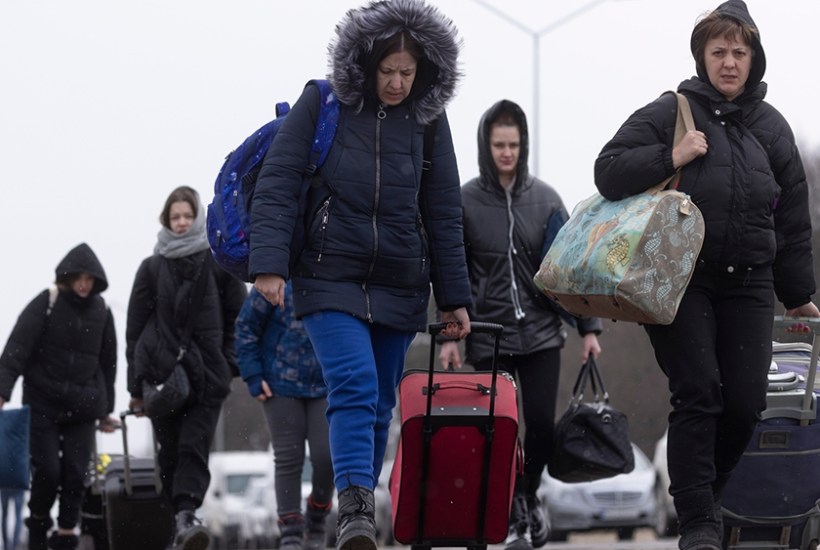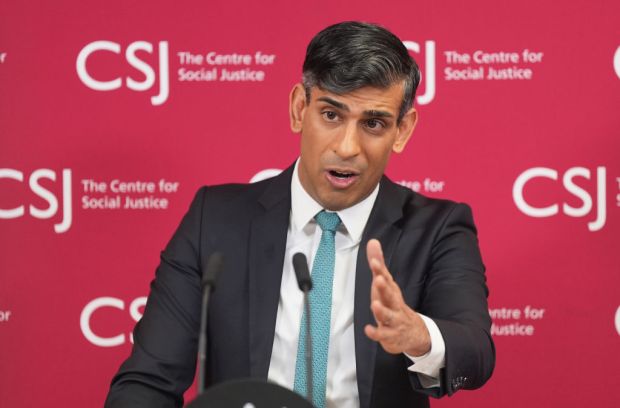Perhaps you’re of the opinion that Ukrainian refugees aren’t our problem, that the world has always been full of foreigners doing ghastly things to each-other, and we can’t be expected to change the settled migration policy of our country just because of a war. Perhaps you wonder why, if we’ve been talking about using gunboats to repel boatloads of Libyans or Syrians and were forced to be ‘realistic’ about the number of people we could accept from Afghanistan, we’re now getting sentimental about Ukrainians.
Perhaps you think that taking people in sounds great on paper but someone’s going to have to pay for it – and what with the energy crisis and the post-Covid state of the NHS and the public finances, we can’t, and that we should take care of our own people first. Perhaps you take the view that keeping them out of Britain does Ukraine a favour; that the best thing is for that country’s two and a half million-odd refugees is to stay somewhere nearby like, say, Poland, so it’s a nice short trip home once the war is over.
Even if you do take one or more of these positions, there’s surely one thing we can agree on: that the shiftiness and dishonesty of the government’s response to the refugee crisis so far should make us all burn with shame. If the official position is: ‘terribly sorry, we’re full up’, or that it’s Europe’s problem not ours, then would it not be the right thing to make a clean breast of it and say so? That would at least be leadership – even if it’s not the sort of leadership that many of us would particularly care for. What we have instead done – the gap between our national rhetoric and our actions – has made us look, as a nation, not only small-minded and mean-spirited but cowardly to boot.
The Prime Minister saying the UK is ‘way out in front in our willingness to help refugees’ was doubly obnoxious. First it was an insult to the intelligence of everyone capable of glancing at a newspaper, where they will have read that while every other country in the EU opened its doors, the UK announced its ‘world-first’ visa system and then admitted that only 50 had been granted. The EU managed to give shelter to 28,000 times that many people. And second, the PM’s statement even found time to piggyback on that lie the notion (wearyingly inescapable since Brexit) that everything up to and including helping people fleeing for their lives is a matter for national one-upmanship. Look at us! We’re way out in front!
Boris, dear, we’re not even on the same racetrack. Not only is there no apparent political will to offer serious help to refugees from a European war, but the will to obstruct them has manifested through a chiselling and evasive series of backroom manoeuvres. We can’t muster the courage to say ‘no’, it seems, so we’re just making it practically impossible for them, using the attritional methods of the one thing we really do lead the world in: the automated unhelpfulness of a customer service phoneline. Global Britain, which was supposed to have liberated itself from the hidebound bureaucracy of the EU, is barricading itself with a tangle of red tape.
That visa scheme, for instance. One report I saw had Ukrainians with family in the UK being told in Warsaw to travel five hours to another location; and then being told in the other location that they needed to go back to Warsaw. The Home Secretary claimed, which turned out not to be true, that they were opening a new route for refugees. Then she announced that a visa centre was open in Calais, which was also not true. The Home Office then said there was one opening in Lille – which was also not true. Among the excuses proffered for all this was the fear that Russian spies or Chechen jihadists might sneak in disguised as refugees – no doubt thirsty for the dossier of national secrets that we like to hand over to all penniless immigrants on arrival in Dover.
Jesus, as it is reliably reported in the Bible, wept. Now, possibly in response to all this coming out, a new scheme was hatched. Britons will be eligible to claim £350 a week for putting refugees up in their spare rooms. A website to register interest in the ‘Homes for Ukraine’ scheme goes live this morning. And contra earlier reports, it looks like sponsors won’t have to apply to take named refugees (which would have effectively limited the scheme to those already having connections to the UK). It’s a hard heart that wouldn’t applaud the spirit of this concession, at least. There are no theoretical limits on numbers and refugees will be entitled to remain, work and access public services for three years.
But this has the feel of a policy drawn up on the back of an envelope – and I have my doubts as to how much of a change of heart it really represents. In the first place, the government insists that host families will be subject to vetting and refugees to security checks – to preclude exploitation or abuse from the former and (I suppose) espionage from the latter. But if ‘tens of thousands’ of refugees could be arriving under this scheme, as Mr Gove said yesterday, the first of them in the next week, who is going to be able to carry out these checks? Who’s going to administer the scheme? Is some vast supplementary bureaucracy of fabulous speed and efficiency going to be magicked up Hogwarts-style from a country that takes the best part of a week to figure out if it has a visa office in Lille, or Calais, or neither?
How will families and hosts be matched up? How will we guard against the vast instances of fraud that bedevilled the Covid furlough scheme? And apart from a weekly cheque, what sort of ongoing support will be on offer? What happens when some of these arrangements break down – when family circumstances change, money gets tighter or (as some refugee charities have warned) traumatised refugees turn out to be more of a handful than a sponsor had at first imagined? Is this effective privatisation of our refugee response going to turn out to create more problems than it solves?
It sounds like an improvement. It even sounds like practical compassion. But what’s the betting that the next few weeks the bureaucracy turns out to be tricker than anticipated, and that what was first bruited as 200,000, then as ‘tens of thousands’, turns out to be a very much more modest number even than that? That would be a comfort to anyone who holds the views I outlined in my first paragraphs, but not to the majority of the public which, according to the polls, seems to think differently.
Got something to add? Join the discussion and comment below.
Get 10 issues for just $10
Subscribe to The Spectator Australia today for the next 10 magazine issues, plus full online access, for just $10.




















Comments
Don't miss out
Join the conversation with other Spectator Australia readers. Subscribe to leave a comment.
SUBSCRIBEAlready a subscriber? Log in